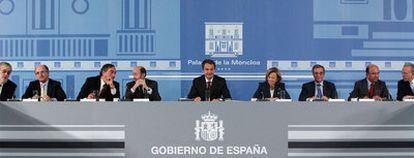Stay on to fight economic crisis, business leaders tell Zapatero
Any announcement of timetable for PM stepping down would affect market stability, argues Santander's Botín
Spain's biggest business leaders are asking Prime Minister José Luis Rodríguez Zapatero not to call early elections, as demanded by the opposition, and to focus instead on the economy.
During Saturday's four-hour meeting with 41 heads of major companies, including Banco Santander's Emilio Botín, Zapatero promised to implement a new set of economic reforms to meet the EU's new, tougher rules for the euro, approved on Friday in the middle of speculation following the fall of the Portuguese government. He also claimed that the international markets believe in Spain once again, and that the worst is over, in reference to recurring fears that the country might need a bailout like Greece and Ireland before it, and possibly Portugal in the near future.
Botín and other business leaders also urged Zapatero not to announce whether he plans to run for a third term in 2012, even though many of his Socialist colleagues want him to, arguing that to do so would make the markets jittery once again.
In recent months, many observers have speculated over whether Zapatero will be replaced by his powerful deputy prime minister, Alfredo Pérez Rubalcaba, as the Socialist candidate in the next general elections. In any case, Zapatero has said that primaries would be necessary to elect a new party leader, while Defense Minister Carme Chacón has also allowed rumors to build about a possible tilt for the top job.
Speaking to the business leaders, Zapatero promised to carry on with new reforms that will affect the labor market, regional government powers, the energy industry and the informal economy, with the overall goals of improving the country's competitiveness and reducing costs.
For their part, business leaders offered to talk to the opposition Popular Party to help try to reach cross-party consensus on economic affairs.
According to Zapatero, "the vast majority" of company representatives agreed that Spain's economic situation had shown a "clear improvement" in recent months. In a press conference following the meeting, the Spanish leader stated that the political calendar would always be secondary to his government's economic reforms.
Last week in Brussels, the Spanish government announced eight major measures to improve the solvency and competitiveness of Spanish companies in the face of an enduring economic crisis. Next Friday, the Cabinet is due to create a special committee whose seven members will be tasked with producing a rigorous, independent analysis of the competitiveness of Spanish corporations.
As part of the new drive to improve the economy, the government is planning changes to bankruptcy legislation to enable troubled companies to refinance their debt; it will also adapt professional services laws to eliminate the need to join a professional association in certain cases. Authorities are also targeting irregular hirings, and will offer businesses incentives to legalize their employees' situation between June 2011 and December 2012.
Over the next six months, Zapatero's administration will also seek to improve the status of vocational training- traditionally an undervalued career path in Spain compared with a college education- and work with regional governments to step up employment policies.











































